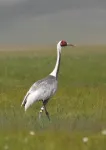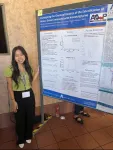(Press-News.org) The researchers used tiny GPS tracking devices to follow the movements of 104 cranes in Africa, Asia, and Europe. These devices included unique solar-powered GPS leg bands developed by scientists from MPI-AB. The tracking data revealed the impressive migrations that cranes undertook. Some of the migratory routes exceeded 6,400 km of travel round trip and required crossing barriers such as the Alps or Himalaya mountain ranges, the deserts of the Arabian peninsula, or the Mediterranean Sea. In addition to the tracking study, the researchers also developed a statistical framework that revealed how the cranes’ movements relate to aspects of the environment, such as the presence of crops or water bodies nearby, and the temperature and vegetation cover on the land.
“Animals have to satisfy their own needs with what they can get from their environment, but both of these are changing constantly,” says Scott Yanco, first author on the study and a postdoctoral researcher at the University of Michigan. “This creates an intriguing optimization problem that we wanted to know if cranes were solving through long-distance migration.”
The researchers found that all four crane species experienced starkly different environmental conditions over a year, and that these periods were synchronized with important events in their lives. This was particularly pronounced when comparing temperatures or resource availability on wintering and summer breeding grounds. For some, the migrations themselves entailed huge shifts in environmental conditions. For example, the demoiselle cranes migrated across the Tibetan plateau and had to contend with massive fluctuations in temperature while doing so.
“We suspect this all has to do with different biological needs during these different times of the year,” adds Yanco, who did the research when he was at the Yale Center for Biodiversity and Global Change. For example, common cranes clearly emphasised agricultural areas during the late summer, a period that aligns with raising juveniles and preparing for fall migration. “This is exactly when we would expect them to want easy access to food,” he says.
For other species, access to food may come at a cost. The black-necked cranes in the study had to decide between safe roosting habitat and abundant resources. “Amazingly, the balance between these competing needs changed over the year depending on what the birds were doing,” adds Yanco. During migration they opted for safer roosting conditions, whereas during breeding they leaned towards abundant food.
“This type of shifting emphasis depending on what cranes need at any given time is what we were expecting to see,” says Ivan Pokrovsky, a postdoctoral researcher at MPI-AB and last author on the study. “But we were blown away by how well the cranes used movement to resolve trade-offs among competing needs and to access certain environments during key periods of the year.”
Understanding how animals interact with their surroundings not only gives us a more nuanced view of how they survive in complex environments—it is crucial for developing policy and management actions to address the dual crises of climate change and biodiversity loss, the authors say. The study’s framework offers a statistical tool for understanding the complicated relationships between animals and their environments that can be widely applied to conservation and management efforts of wildlife.
“When we know how animals use certain environmental conditions, we can make better predictions about how species might respond to human-caused global change and develop more effective interventions that ensure we preserve the conditions species need to survive,” says Pokrovsky.
END
How cranes navigate their complex world
Study of four crane species reveals the complicated relationships between birds and their environments
2024-09-23
ELSE PRESS RELEASES FROM THIS DATE:
New origami-inspired system turns flat-pack tubes into strong building materials
2024-09-23
Engineers at RMIT University have designed an innovative tubular structural system that can be packed flat for easier transport and pop up into strong building materials.
This breakthrough is made possible by a self-locking system inspired by curved-crease origami — a technique that uses curved crease lines in paper folding.
Lead researchers, Dr Jeff (Ting-Uei) Lee and Distinguished Professor Mike (Yi Min) Xie, said bamboo, which has internal structures providing natural reinforcement, inspired the tube design.
“This self-locking system is the result of an intelligent geometric design,” said Lee from RMIT’s School of Engineering. ...
Low gravity in space travel found to weaken and disrupt normal rhythm in heart muscle cells
2024-09-23
Johns Hopkins Medicine scientists who arranged for 48 human bioengineered heart tissue samples to spend 30 days at the International Space Station report evidence that the low gravity conditions in space weakened the tissues and disrupted their normal rhythmic beats when compared to earth-bound samples from the same source.
The scientists said the heart tissues “really don’t fare well in space,” and over time, the tissues aboard the space station beat about half as strong as tissues from the same source kept on Earth.
The findings, ...
New approach to defibrillation may improve cardiac arrest outcomes
2024-09-23
Joshua Lupton, M.D., has no memory of his own cardiac arrest in 2016. He only knows that first responders resuscitated his heart with a shock from a defibrillator, ultimately leading to his complete recovery and putting him among fewer than one in 10 people nationwide who survive cardiac arrest outside of a hospital.
He attributes his survival to the rapid defibrillation he received from first responders — but not everybody is so fortunate.
Now, as lead author on a new observational study published in the journal JAMA Network Open, he and co-authors from Oregon Health & Science University ...
UTA undergraduate researcher wins state honor
2024-09-23
A student studying biological chemistry at The University of Texas at Arlington earned a state-wide award for her research on diazo compounds, the building blocks of some medications. Jenny Hoang, a senior, received the third-place award at the 2024 University of Texas System Louis Stokes Alliance for Minority Participation (LSAMP) conference held in El Paso in August.
“Honestly, I was so shocked that I won third place because I almost didn’t even apply for this program,” said Hoang, a Carrollton ...
Novel method detects biological oxidant derived from CO2 in cells
2024-09-23
High levels of carbon dioxide (CO2) in the atmosphere can alter not only the climate of our planet but also the functioning of our cells. The gas interacts with hydrogen peroxide (H2O2), which performs various functions in the human body, giving rise to a potent oxidant called peroxymonocarbonate.
"More and more evidence is emerging that peroxymonocarbonate is important in both cells’ adaptive responses via redox signaling and in cellular dysfunction. There is also epidemiological evidence that the levels of CO2 our cities are close to reaching cause a number of physiological problems. And the mechanisms underlying the toxicity of CO2 are ...
American Cancer Society experts presenting key research at 2024 ASCO Quality Care Symposium
2024-09-23
Scientists from the American Cancer Society (ACS) are presenting research studies at the 2024 Annual Meeting of the American Society of Clinical Oncology (ASCO) Quality Care Symposium (QCS) September 27-28 in San Francisco, CA. ASCO QCS offers research and education that encompasses the needs and viewpoints of multiple disciplines and various practice settings, attracting oncology professionals from around the world. This year’s program will feature studies complementing the meeting’s theme: “Driving Solutions, Implementing ...
New research identifies critical gaps in mental health care for adults with schizophrenia spectrum disorders
2024-09-23
New research finds that adults with schizophrenia spectrum disorders have high rates of comorbid mental and substance use disorders and significant social and economic disadvantages, and only 26% received minimally adequate treatment. Meeting the needs of people with schizophrenia spectrum disorders will require innovative interventions and implementation to improve access to and use of evidence-based approaches, the authors argue. The research was published today in Psychiatric Services in Advance.
The researchers, led by Natalie Bareis, Ph.D., ...
Advances in theranostics take center stage at SNMMI 2024 Therapeutics Conference
2024-09-23
Reston, VA (September 23, 2024)—More than 300 nuclear medicine clinicians, researchers, technologists, regulators and suppliers gathered in Bethesda, Maryland, on September 19-21, for the Society of Nuclear Medicine and Molecular Imaging (SNMMI) 2024 Therapeutics Conference. As the largest SNMMI Therapeutics Conference to date, the meeting offered attendees the chance to explore the latest innovations and advancements in theranostics and other nuclear medicine therapies as well as gain valuable insights into enhancing their practice.
This year’s Therapeutics Conference included eight distinct sessions covering advances in radiopharmaceutical ...
Firms that withdrew from Russia following Ukraine invasion earn higher consumer sentiment
2024-09-23
Following Russia’s 2022 invasion of Ukraine, many companies with operations in Russia withdrew from or severely curtailed their Russian operations. For example, Dell and McDonald’s ceased all operations in Russia after the invasion.
Many experts have argued that the corporate response to the Ukraine war is a striking example of stakeholder capitalism, a model where corporations are responsible for considering the interests of various stakeholders — including employees, customers, communities, governments and the environment — and not just ...
Biologist pioneers increased protein in staple crops, helps alleviate global protein shortage
2024-09-23
A Mississippi State biologist’s groundbreaking research in improving global nutrition and sustainability is featured this week in New Phytologist, a leading plant biology journal.
Ling Li, an associate professor in the MSU Department of Biological Sciences, has spent more than a decade studying rice and soybean crops, with the goal of providing a new strategy for crop improvement to increase protein content. Her work offers a potential solution to combat global protein deficiency, a condition affecting millions, particularly children, contributing to cognitive impairments, stunted growth and susceptibility to diseases like Kwashiorkor, ...
LAST 30 PRESS RELEASES:
Scientists discover why we know when to stop scratching an itch
A hidden reason inner ear cells die – and what it means for preventing hearing loss
Researchers discover how tuberculosis bacteria use a “stealth” mechanism to evade the immune system
New microscopy technique lets scientists see cells in unprecedented detail and color
Sometimes less is more: Scientists rethink how to pack medicine into tiny delivery capsules
Scientists build low-cost microscope to study living cells in zero gravity
The Biophysical Journal names Denis V. Titov the 2025 Paper of the Year-Early Career Investigator awardee
Scientists show how your body senses cold—and why menthol feels cool
Scientists deliver new molecule for getting DNA into cells
Study reveals insights about brain regions linked to OCD, informing potential treatments
Does ocean saltiness influence El Niño?
2026 Young Investigators: ONR celebrates new talent tackling warfighter challenges
Genetics help explain who gets the ‘telltale tingle’ from music, art and literature
Many Americans misunderstand medical aid in dying laws
Researchers publish landmark infectious disease study in ‘Science’
New NSF award supports innovative role-playing game approach to strengthening research security in academia
Kumar named to ACMA Emerging Leaders Program for 2026
AI language models could transform aquatic environmental risk assessment
New isotope tools reveal hidden pathways reshaping the global nitrogen cycle
Study reveals how antibiotic structure controls removal from water using biochar
Why chronic pain lasts longer in women: Immune cells offer clues
Toxic exposure creates epigenetic disease risk over 20 generations
More time spent on social media linked to steroid use intentions among boys and men
New study suggests a “kick it while it’s down” approach to cancer treatment could improve cure rates
Milken Institute, Ann Theodore Foundation launch new grant to support clinical trial for potential sarcoidosis treatment
New strategies boost effectiveness of CAR-NK therapy against cancer
Study: Adolescent cannabis use linked to doubling risk of psychotic and bipolar disorders
Invisible harms: drug-related deaths spike after hurricanes and tropical storms
Adolescent cannabis use and risk of psychotic, bipolar, depressive, and anxiety disorders
Anxiety, depression, and care barriers in adults with intellectual and developmental disabilities
[Press-News.org] How cranes navigate their complex worldStudy of four crane species reveals the complicated relationships between birds and their environments









